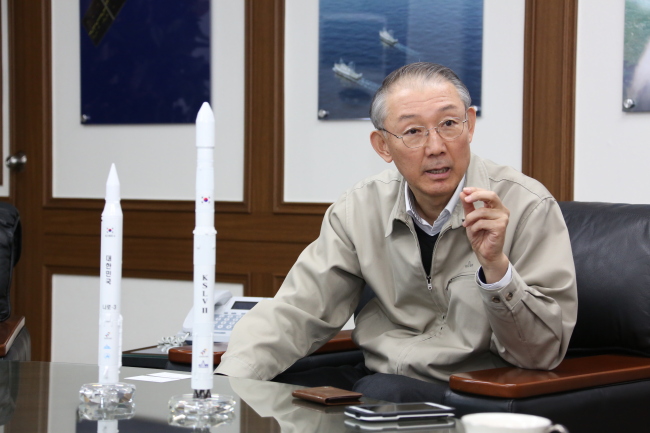[Weekender] 'Giving up not an option for Korea’s space development'
Chief of Korea’s NASA talks about life-long mission, challenges, expectations for the country’s first self-developed rocket, lunar exploration project
By Korea HeraldPublished : March 25, 2016 - 14:17
DAEJEON -- Like many people, Cho Gwang-rae, president of the Korea Aerospace Research Institute, has always been fascinated by space rockets and outer space.
He grew up watching foreign astronauts land on the moon, amid fierce space competition between the U.S. and then-Soviet Union in the late ’60s. However, he never envisioned that he would one day become the person in charge of Korea’s space project.
After earning his Ph.D. in high-frequency microwave engineering, Cho was asked to participate in a project to build an experimental rocket in the late ’80s -- new territory for Korean engineers at the time. He thought to himself, “Why not?”

As a founding member of the state-funded KARI, Cho knew little about how rockets worked back in the early days. When helping to build Korea’s first scientific rocket, he had to rely solely on what he remembered of rockets that he had seen on research trips to the U.S.
There was no one to show or guide the way. It was truly a “mission” for him to continue in this uncharted territory with few resources and outside help.
“There is no such thing as ‘space technology transfers’ between countries -- you’re on your own,” said Cho in an interview with The Korea Herald.
“The countries with the technology always have the upper hand. This was the most difficult part that we had to endure when interacting, not just with Russia, but also countries like the U.S. and France.”
After years of struggling and self-learning, he led the nation’s first space rocket development project, building the Korea Space Launch Vehicle-I also known as Naro-I, in cooperation with Russia.
When putting together the Naro-I rocket -- the first stage of which was brought in from Russia -- Korea “could do nothing but wait” as Russia, which held the core engine technology, frequently failed to meet scheduled deliveries, delaying the entire project, Cho said.
Following two failed attempts, Cho and his team succeeded in launching the Naro-I space rocket in January 2013, placing Korea as the 10th member to join the exclusive club of countries capable of sending a satellite into the earth’s orbit.
Since the landmark success, Cho is now busier than ever as he prepares to carry out the nation’s first ever lunar exploration project. It is closely linked to the success of the Korea Space Launch Vehicle-II, a three-stage rocket being built exclusively with Korean technology.
Developing a high-power rocket engine capable of traveling beyond the earth’s orbital sphere is key. But stabilizing the internal combustion of a 75-ton thrust engine was a major hurdle that blocked progress on the rocket’s development throughout last year.
After countless performance tests, KARI succeeded in fixing the technical glitches early this year, taking a significant leap forward in sending the KSLV-II into space by 2020 as scheduled.
“As of January, we finally overcame the combustion instability issue that had halted KSLV-II’s further development, clearing the way for the continuation of our rocket development,” he said with confidence.
Despite the recent progress on the new carrier rocket, Cho believes there is “no time to pause for celebration,” as Korea’s core space transportation technology is still miles away from where it needs to be.
Above all else, Korea must “focus on developing and stabilizing its rocket technology over the next 10 to 15 years,” he said, noting that acquiring the ability to travel to space is directly linked to a country’s power and future position in the international community.
“Attaining essential space transportation technologies determines which countries can wield influence over space territories in the future,” he said.
The Korean government has put aside 1.96 trillion won ($1.67 billion) for constructing the KSLV-II by 2020. It also plans to inject an additional 197.8 billion won over the next three years into the country’s lunar exploration project, which includes plans to build a lunar orbiter and landing vessel to be later sent to the moon through the KSLV-II.
When asked about the biggest challenges that lie ahead, Cho pointed to “overcoming the fear of failure.”
“Koreans are quite unforgiving to those who make mistakes,” he said, recalling the public criticism he and KARI faced over the two failed Naro-1 launches.
“But giving up has never been and will never be an option for me and Korea’s space development efforts,” he said.
“If we fail, we will simply try again and again until we succeed.”
By Sohn Ji-young (jys@heraldcorp.com)
-
Articles by Korea Herald



















